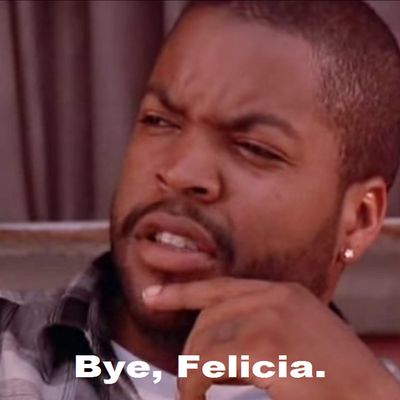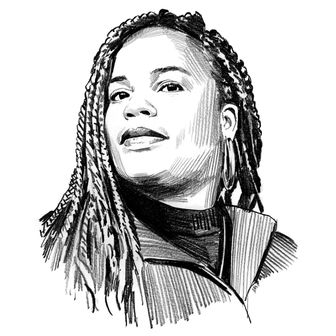
We have Ice Cube’s 1995 classic, Friday, to thank for the very useful phrase “Bye, Felicia”: In the movie, his character gets rid of a freeloading neighbor with this curt, simple phrase. Bye, Felicia. More recently, the phrase has found new life as the most satisfying way to dismiss Twitter trolls. “Bye, Felicia” is a diss. The ultimate shutdown. You say it to people who annoy you, who’ve insulted you, who’ve dared to disturb your airspace with their existence.
This week is the perfect time to consider the origins of #ByeFelicia, since the N.W.A. biopic Straight Outta Compton opens in theaters. The movie is essentially N.W.A.’s creation story, as well as a hero’s tale for both Ice Cube and Dr. Dre; it’s packed with retellings and reexaminations of crucial moments in the rap group’s history. We see Eazy-E drop that iconic first line of “Boyz-N-the Hood”; we see Dr. Dre and Snoop writing “Nuthin But a ‘G’ Thang”; we see the incident of brutality that inspired Ice Cube to pen “Fuck Tha Police.”
And, because no Ice Cube origin story could leave out “Bye, Felicia,” the movie provides a fictionalized version of the moment that phrase was first uttered.
A young Dr. Dre is in his room while a party rages in the crew’s hotel suite. Suddenly, two armed men start pounding on the door — one of them is looking for his girl, Felicia. Dre slams the door, walks into the next room looking for Felicia, whom he finds fellating Eazy-E. Ice Cube, Dre, and Eazy-E grab some guns, reopen the door to confront the two intruders, and inform them that Felicia was too busy sucking someone else’s dick to come to the door. After the two intruders run down the hall, Eazy-E grabs Felicia — who is wearing nothing but a hot-pink thong — and pushes her out into the hotel corridor by the head. As the door slams, Ice Cube deploys the very first “Bye, Felicia.”
At the screening I attended, this scene was met with major laughs. I was surprised: I couldn’t quite see the comedic value in naked women getting pushed around, even in conjunction with everyone’s favorite hashtag. Did the scene have any basis in N.W.A.’s real history, I wondered. I called Straight Outta Compton director F. Gary Gray to ask how the scene came to be.
Gray explained that the “brilliant” moment was fictitious and added spontaneously during a late-night shoot. The character’s name was Felicia in the script, and it was the actor who portrays young Ice Cube, his son O’Shea Jackson Jr., who thought they should add the reference.
“That just happened to be a fun moment that we capitalized on during the process of shooting,” he said. “Some people may feel like it’s the origin of ‘Bye, Felicia,’ but it’s a fun moment, a wink and a nod to the original Friday and a little bit of fun. It’s one of the funniest moments in the movie.”
But here’s what made me uncomfortable about that: Straight Outta Compton has been widely criticized for failing to address Dr. Dre’s brutal assault of female journalist Dee Barnes in 1991. It fails to acknowledge the contributions of the female emcees like Ice Cube’s protégé Yo-Yo. The movie’s few female characters are either groupies at parties or selfless caregivers, i.e., mothers and doting wives. The movie’s stars, mainly Ice Cube, have brushed off N.W.A.’s less-than-women-positive lyrics in a quote that evoked “bitch,” “ho,” and “despicable female.” And the tie-in album, Compton, Dr. Dre’s first in 16 years, features an unlistenable skit at the end of “Loose Cannon,” where a woman begs for her life, is brutally shot, and then buried in a hole. (We hear that discussion, too.) In this context, it’s harder to brush off a little lighthearted misogyny.
I asked Gray how, as a director, he was able to reconcile the fun pop-culture reference with a moment of degradation. “I wouldn’t try to reconcile it at all,” he said. “If you’re looking to be politically correct in entertainment, especially as it relates to comedy, that’s the end of entertainment. If people want us to make entertainment in a certain way, you tell me how we should have shot the scene.”
I said I didn’t know and he went on, “That’s just an awful question. You know. It’s like, if Oprah says it’s a powerful movie, and we know how she feels about how women are depicted in film and entertainment and things like that — I feel like you’re digging. We should be focusing on how the police are treating innocent American citizens. What about that? Let’s talk about something as important, if not more important, if you really want to go there.”
The interview ended abruptly after that. Though, to his credit, Gray didn’t lob a “Bye, Felicia” at me when he hung up.


